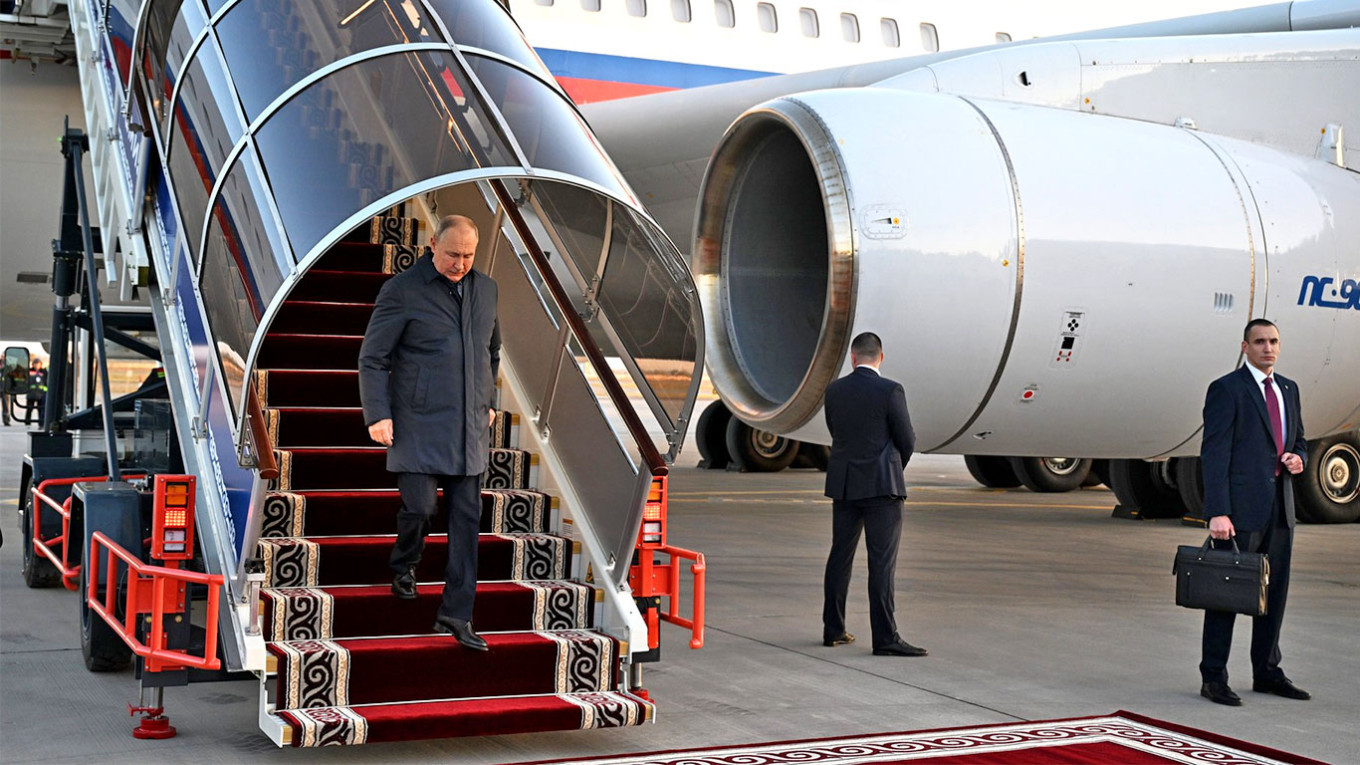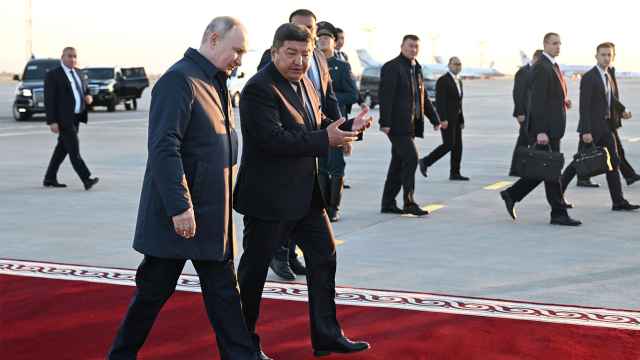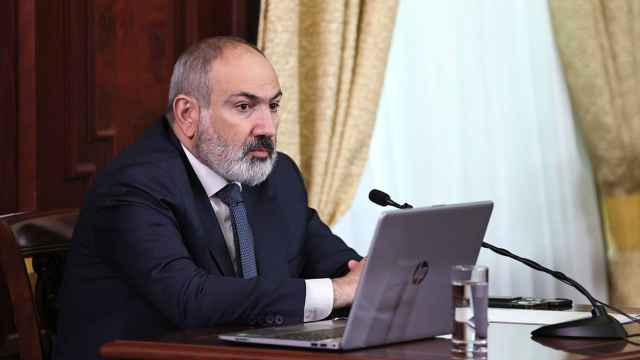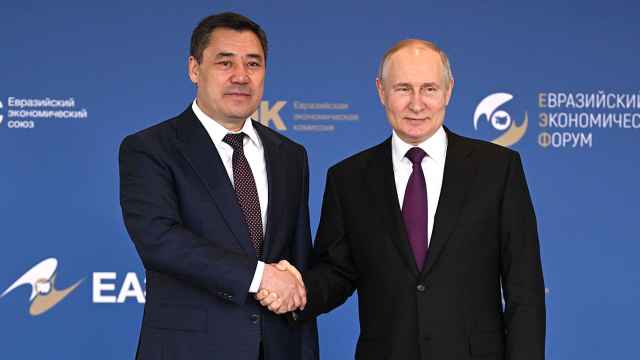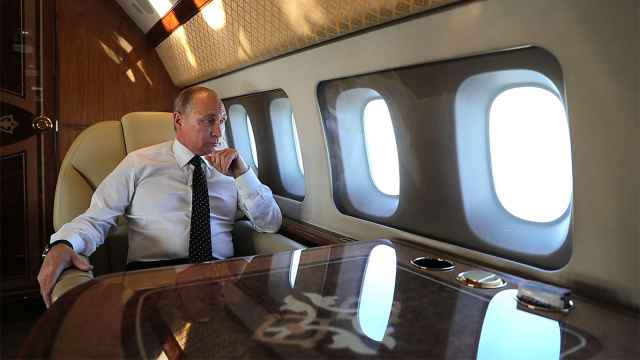President Vladimir Putin’s visit to Kyrgyzstan is an attempt to stem the erosion of the Kremlin's diminishing regional influence as its failures in Nagorno-Karabakh and 20-month war in Ukraine make allies increasingly uneasy, experts told The Moscow Times.
With the two-day visit — Putin’s first foreign trip since being indicted by the International Criminal Court on war crimes charges in March — the Russian leader also seeks to demonstrate that he is unbothered by the warrant for his arrest.
“The number of countries where Putin will now go is small and continues to shrink. Kyrgyzstan is one of the few. The leadership of this country is actively trying to prove its loyalty to the Kremlin,” Temur Umarov, a fellow at the Carnegie Center for Russia and Eurasia Studies in Berlin, told The Moscow Times.
The Kremlin spared no cost on security precautions aimed at preventing his arrest and the threat of potential attacks, sources with knowledge of the trip’s planning told The Moscow Times.
Planning for the trip lasted more than a month, with anti-terrorist security a key focus, a Russian government source said. Another source close to the Kremlin who previously served in the security services confirmed this information.
Both agreed to speak on condition of anonymity because they were not authorized to discuss Putin's security with the press.
“The chief's trip to Bishkek is taking place amid unprecedented security measures,” the Russian government official said, using a moniker for Putin widely used by officials.
“Our special services have been discussing [everything] with the Kyrgyz, all the way down to protection against drones and restrictions on mobile communications.”
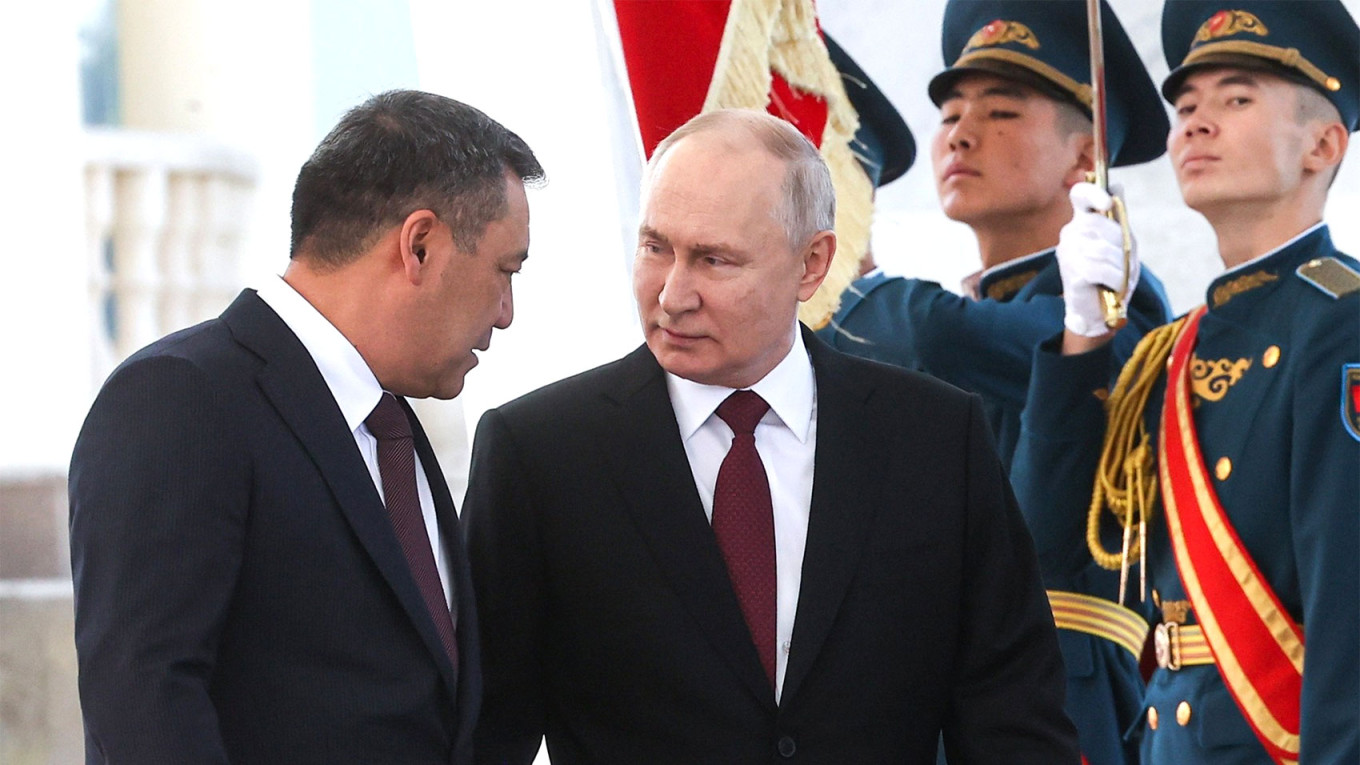
The source close to the Kremlin said these security measures were one of Moscow’s preconditions for Putin’s visit.
"Traveling is not safe at the moment. We bear in mind the desperation and treachery of the Ukrainians and the fact that they are being aided by the West," the source told The Moscow Times.
As Putin arrived in Bishkek early Thursday, the cellular network in the Kyrgyz capital cut out and widespread internet outages were reported. According to local media, the reason was Putin's arrival. One mobile operator said the outages were the result of a damaged cable.
Soon after Putin's plane landed in Kyrgyzstan, his limousine, in a 20-car motorcade escorted by police vehicles with flashing lights, drove through deserted streets to the Kyrgyz president's residence.
Kyrgyz police asked Bishkek residents not to drive their personal vehicles in the city or in the direction of the Kyrgyz president's residence during Putin's visit, while electric scooters were removed from the city streets. Kindergartens, schools and universities asked their students to attend classes remotely on Thursday and Friday.
Even the National Center for Oncology and Hematology’s chemotherapy department was impacted, with its medical facility closed on Thursday and Friday, a local online publication reported, citing patients.
More than 4,500 Bishkek police officers were tasked with maintaining public order and security, according to local media.
Putin on Thursday met with Kyrgyz President Sadyr Japarov, presented him with the Russian Order of Honor and congratulated Russian servicemen at the airbase in the city of Kant on the 20th anniversary of its opening. In return, Japarov gifted Putin a traditional Kyrgyz yurt and a horse, the Kommersant business daily’s Kremlin correspondent Andrei Kolesnikov reported.
The presidents also announced the creation of a joint regional air defense system between Russia and Kyrgyzstan.
"The agreement was set for 2022, but the Kyrgyz parliament announced ratification in time for Putin's arrival, which was intended as a symbolic moment," said Umarov.
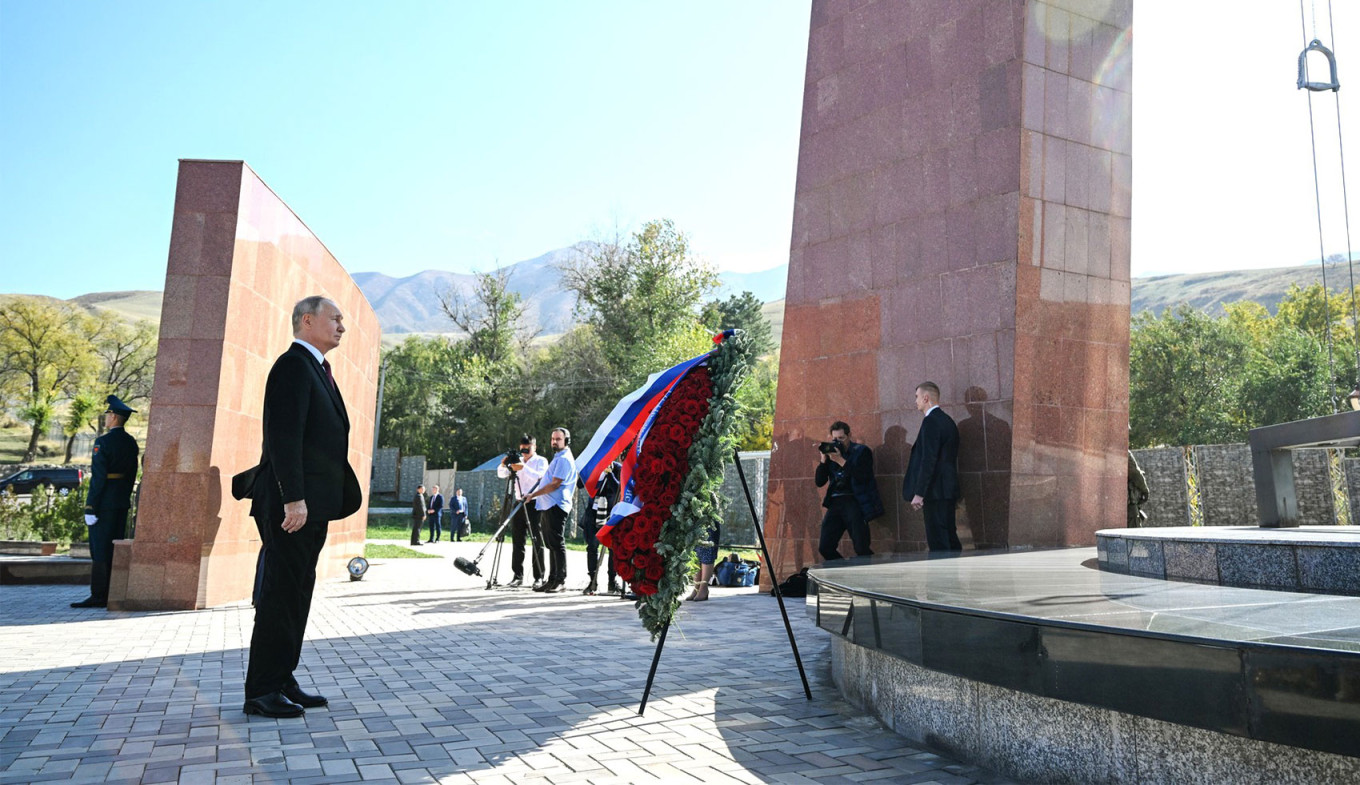
The main purpose of Putin’s trip, a summit of the Moscow-led Commonwealth of Independent States (CIS), an alliance of former Soviet states, opened at the Ala Archa State Residence in Bishkek early Friday morning.
Russia’s position in the bloc has been tarnished by its failed mediation efforts in Nagorno-Karabakh and its 20-month full-scale war on Ukraine which most allies have refrained from backing.
Notably absent from the summit will be Armenia’s Prime Minister Nikol Pashinyan, who skipped the event in a snub to longtime ally Moscow following the Nagorno-Karabakh crisis.
"Relations with Armenia are complicated. I think Moscow does not have much to be happy about,” Andrei Kortunov, director general of the Russian International Affairs Council think tank, told The Moscow Times. “This has an impact on the whole integration agenda with Russia's participation. So they will try to downplay this topic.”
In September, the Azerbaijani military seized control of the disputed region of Nagorno-Karabakh, launching a mass exodus of its population of some 120,000 ethnic Armenians who feared extermination at the hands of Baku. A Russian peacekeeping force in Nagorno-Karabakh largely stood aside.
Soon after, Armenia ratified the ICC’s Rome Statute, meaning it is now obliged to arrest Putin if he crosses its borders — drawing outrage from Moscow.
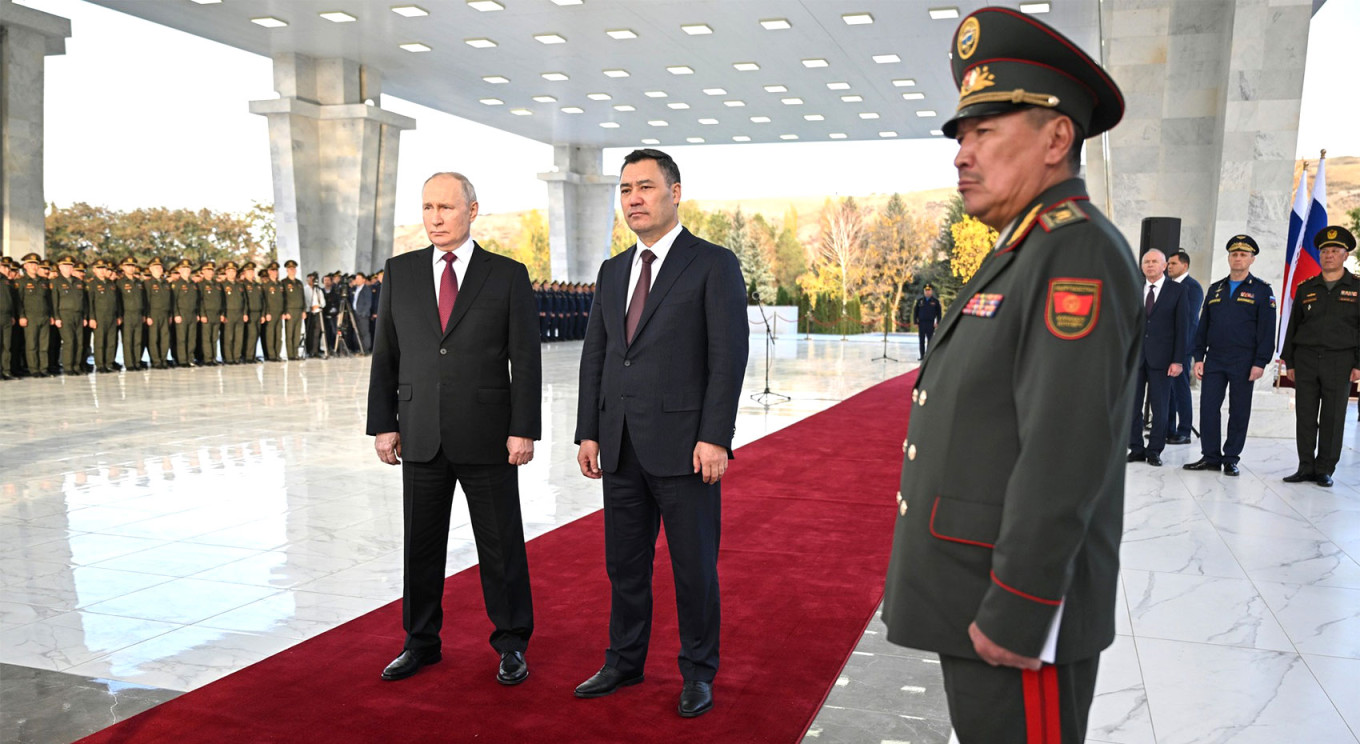
"Armenia has joined the ranks of those countries that used to be Russia's allies, but now it's not clear how to go there — Putin can't go there anymore," said Umarov of Carnegie.
Despite the tensions, the Kremlin is not ready to cut ties completely.
"Friends are never tossed around. And right now we don't have many of them anyway," the Russian government official told The Moscow Times.
At the same time, Putin held talks with Azerbaijani President Ilham Aliyev on Thursday evening.
Russia insists that the agreement to station its peacekeepers in Nagorno-Karabakh is valid until 2025 and intends to extend it, Putin’s foreign affairs aide Yuri Ushakov said on the eve of the Bishkek visit.
"Russia would very much like to keep its military presence there and will insist on the need to ensure the safety of Armenians if they stay or return,” independent CIS analyst Arkady Dubnov told The Moscow Times. “But will Azerbaijan agree to the presence of the Russian military on its territory?"
Also looming large over the CIS summit is Russia’s full-scale invasion of Ukraine, which has shaken many of Moscow’s allies.
"But the shrinking role of Russia in the region cannot be absolutized. They cannot get away from Russia — they are neighbors,” Dubnov said.
“At the same time, they will try to explain to Moscow that they cannot sacrifice their interests to those of Russia. For them, Ukraine is someone else's interest,” he said. “This is not their war.”
A Message from The Moscow Times:
Dear readers,
We are facing unprecedented challenges. Russia's Prosecutor General's Office has designated The Moscow Times as an "undesirable" organization, criminalizing our work and putting our staff at risk of prosecution. This follows our earlier unjust labeling as a "foreign agent."
These actions are direct attempts to silence independent journalism in Russia. The authorities claim our work "discredits the decisions of the Russian leadership." We see things differently: we strive to provide accurate, unbiased reporting on Russia.
We, the journalists of The Moscow Times, refuse to be silenced. But to continue our work, we need your help.
Your support, no matter how small, makes a world of difference. If you can, please support us monthly starting from just $2. It's quick to set up, and every contribution makes a significant impact.
By supporting The Moscow Times, you're defending open, independent journalism in the face of repression. Thank you for standing with us.
Remind me later.



